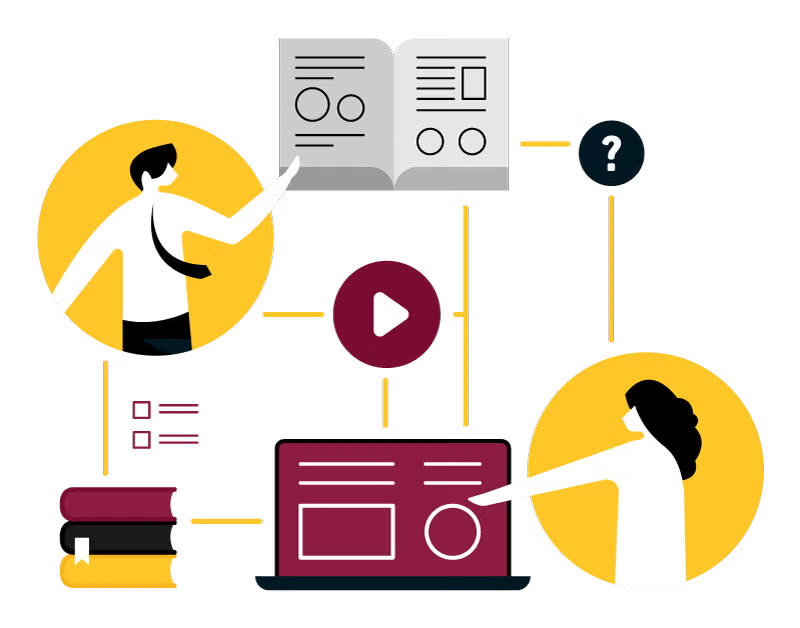Thank you for your interest in AZNext.Due to the conclusion of current funding, no AZNext training courses are scheduled for 2026 at this time. If new funding becomes available, we hope to offer additional courses in the future. In the meantime, many similar learning opportunities are available through other ASU programs, including:
• Executive Education and Lifelong Learning
• ASU Universal Learner Courses
Please note that these programs are not part of AZNext and may require enrollment fees. We remain committed to providing workforce training at no cost when funding allows and appreciate your interest and understanding.

AZNext program
Business Readiness for Veterans
Billed as "for vets, by vets," the no-cost AZNext Business Readiness for Veterans program streamlines the transition veterans face when joining the business world.
Program details
The AZNext transition assistance program for veterans prepares you for a military transition to civilian life and business leadership roles. We've designed five business modules specifically for service members and Department of Defense (DoD) personnel to explain the what, why, and how of business organization structures and functions. Each module includes a mix of instructor-led interaction and online assignments designed to enhance in-person discussion and practical application.
- Communications: U.S. business and professional styles, examples, and contextual expectations
- Organization, administrative/legal, and human resources: Common alignments, missions, and goals
- Business finance and accounting: Common alignments, purposes, goals, models, and jargon
- Business technology: Common alignments, models, and jargon
- Information security and cybersecurity: Common alignments, purposes, models, and jargon
These modules will take place over five weeks, with one each week. The first session is eight hours in person at the Tempe campus. While we strongly recommend being in person for the first session, we understand and support military obligations. Those with prior exceptions can participate remotely. The remaining eight sessions will be twice a week with a hybrid model for participation. Expected participant effort is estimated to take six to eight hours a week.
Who is this program for?
The AZNext Business Readiness for Veterans program is ideal for service members wishing to transition into business and professional environments. Through modules emphasizing select functional areas and activities, you'll improve and expedite your transition by becoming a more effective business and technology leader. This program is targeted to veterans or active service members entering or already in technology or manufacturing industries.
Participants must be:
What will I learn?
Participants in this program have access to a team of instructors who are experienced business leaders. Most of the instructors are veterans who want to reduce the challenges for other veterans transitioning into post-service careers. The additional context that instructors who have served provide increases the potential for program participant success.
Each module taught by our instructors has DoD equivalents and explains how functions, responsibilities, applications, expectations, and jargon differ from military service in modern business and professional environments. These modules cover topics cited as challenges faced during civilian transitions by over 100 veterans we interviewed.
Learning themes:
- Overview of common finance and accounting functions, purposes, and alignments
- How and why business strategy drives technology, data, security, and policies
- How to produce clear, concise, and effective audience and purpose-specific business cases for multiple scenarios
- The impact of Enterprise Architecture and strategic planning on business processes
- Ways to articulate the mission and goals of information and cybersecurity functions

What careers can this program lead to?
Participants of the AZNext military transition assistance program gain an improved understanding of business jargon, media, and discourse. They know how to communicate effectively in business and professional settings. You'll be prepared for post-service opportunities, accelerate your recent transition, and improve your general business acumen. Graduates receive a digital badge credential and access to AZNext industry partners for job placement.
Potential career paths for program graduates include:
- Project manager: The median annual wage is $98,580, and the employment rate is expected to grow seven percent between 2023 and 2033.
- Engineering manager: The median annual wage is $165,370, and the employment rate is expected to grow six percent between 2023 and 2033.
- Information security analyst: The median annual wage is $120,360, and the employment rate is expected to grow 33 percent between 2023 and 2033.
- Logistician: The median annual wage is $79,400, and the employment rate is expected to grow 19 percent between 2023 and 2033.
Testimonials from our veteran alumni
Contact AZNext
AZNext is closing the skills gap to build the future workforce. Please email us at [email protected] to learn more about the ASU AZNext program.